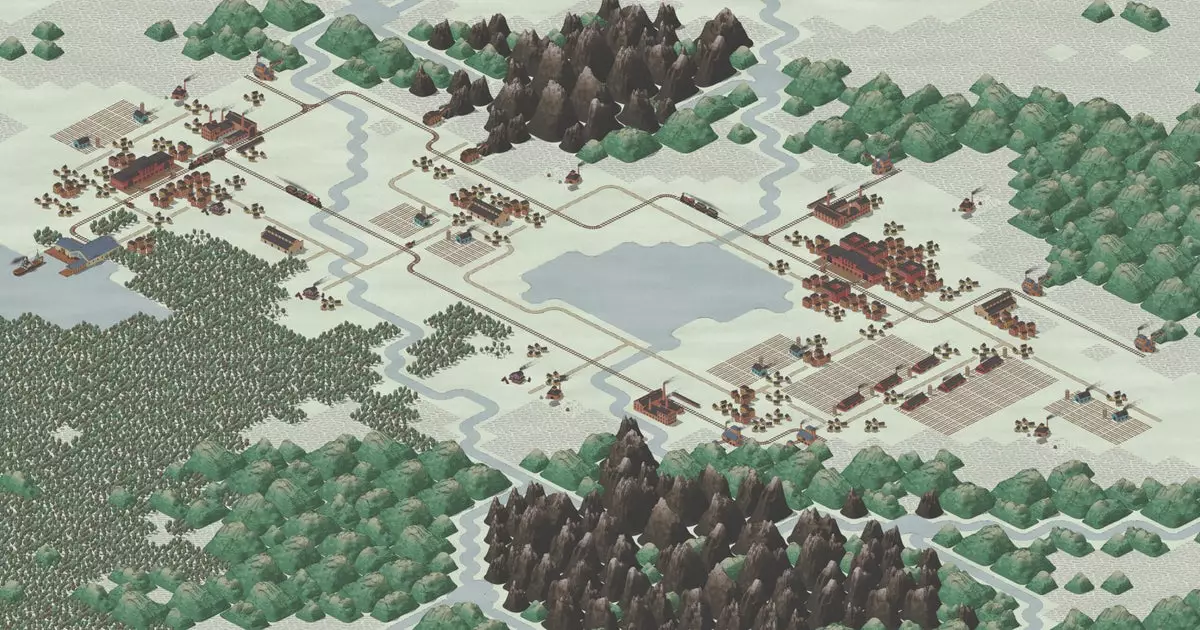“Times Of Progress” is not just another city-building simulation; it holds sentimental value as the first news tip I received from Sin Vega, an influential figure in the realm of strategy gaming. This encounter occurred during the spring of this year, where Sin eloquently described the process of writing news articles for Alice0 from Rock, Paper, Shotgun as akin to a novice practicing backflips in front of a kung fu master. This vivid analogy reflects not only the nerve-wracking pressures of creative writing but also sets the stage for the unique experience that “Times Of Progress” offers. Indeed, my task here feels like attempting to manage the development of Londinium under the watchful gaze of Julius Caesar himself—daunting yet exhilarating.
The pressure of accurately capturing the essence of this game, coupled with the distractions that come with attending international gaming conferences, led to a significant delay in sharing my thoughts. However, today, I step out of my comfort zone to examine this captivating title set in the transformative era of the Industrial Revolution. With a mixture of trepidation and excitement, I hope my observations will resonate with an audience that is as discerning as the historical figures that inspired my writing.
Presentation and Aesthetics: A Visual Feat
From the moment you immerse yourself in “Times Of Progress,” the striking presentation captures your attention. The game unfolds in a procedurally generated isometric environment bursting with life and detail. Roads and railways weave through an intricately crafted tapestry of diamond-shaped towns. The visual aesthetics strike a balance between clean lines and charming animations—from rising smoke plumes to the gradual evolution of humble homes into complex tenements.
However, this minimalistic yet engaging approach may lead some to perceive the game as somewhat condensed compared to other city builders on the market. Yet, upon closer inspection, you will find that the game is rich in systems and mechanics, many of which are deeply rooted in the historical context of the Industrial Revolution.
One standout element of “Times Of Progress” is how it approaches technological advancement and scientific progress. Rather than permitting players to simply designate scientists for research, the game employs a timeline model reflecting the broader context of the industrial age. As you navigate through your city’s development, technology becomes unlocked as part of a collective historical evolution involving not just your city but various AI-controlled cities scattered across the game world.
Essentially, you earn points by meeting specific objectives, which allows you to import technologies that expedite your city’s growth. This mechanic effectively simulates the interconnectedness and competition that characterized the era’s burgeoning trade networks.
A notable absence of military components in the game emphasizes commerce, suggesting that trade and economic negotiation play pivotal roles in building your metropolis. Without a direct focus on cultural layers or military conquests, “Times Of Progress” invites players to engage in mercantile interactions, creating a unique atmosphere distinct from many other city-builder games.
Another fascinating aspect of the game is its reflection on labor politics. Workers can go on strike if they feel their needs are not met, particularly regarding fair compensation through food. The player has several options in response to these labor movements: address their grievances or enforce stricter regulations, potentially invoking a police crackdown.
Players can also foster unionization once the necessary laws are enacted, introducing a layer of complexity to labor relations that significantly impacts productivity. Those with university degrees are more inclined to advocate for their rights, further complicating how you manage human resources within your city. This nuanced approach adds depth, challenging players to consider the social implications of their decisions.
In “Times Of Progress,” the interplay of aesthetics, mechanics, and labor relations create a layered experience that captivates players while also encouraging historical reflection. Although I am initially apprehensive about my critique and insight on this remarkable piece of work, I hope that future discussions, potentially led by Sin himself, will explore its nuances more profoundly. Until then, I encourage everyone to take an interest in this title, available on Steam, and observe how Pressing Thumbs Games—a solo developer operating from Berlin—utilizes programming and game design to reflect this pivotal moment in history.


Leave a Reply
You must be logged in to post a comment.